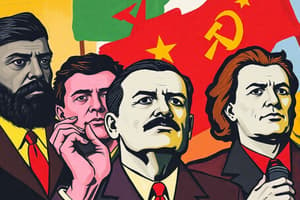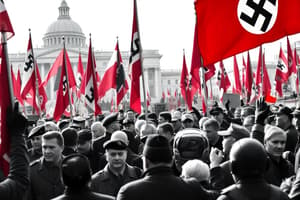Podcast
Questions and Answers
Fascism is primarily a left-wing ideology that favors collectivism and social equality.
Fascism is primarily a left-wing ideology that favors collectivism and social equality.
False (B)
Benito Mussolini and Adolf Hitler were key figures in the development and promotion of fascism in Europe.
Benito Mussolini and Adolf Hitler were key figures in the development and promotion of fascism in Europe.
True (A)
Fascism promotes the idea of democracy and supports multiple political parties.
Fascism promotes the idea of democracy and supports multiple political parties.
False (B)
Fascism emerged in various European countries after initially beginning in Italy during World War I.
Fascism emerged in various European countries after initially beginning in Italy during World War I.
Fascism is often confused due to its lack of theoretical clarity and culture-specific positions taken by its followers.
Fascism is often confused due to its lack of theoretical clarity and culture-specific positions taken by its followers.
Fascism was initially embraced by socialist parties in Europe as a means to promote their agenda.
Fascism was initially embraced by socialist parties in Europe as a means to promote their agenda.
Fascism embraces pacifism as a key ideological principle.
Fascism embraces pacifism as a key ideological principle.
The Nazis specifically targeted socialist and communist parties for repression and persecution.
The Nazis specifically targeted socialist and communist parties for repression and persecution.
Salvemini believed that fascists could only be understood through their ideological propositions.
Salvemini believed that fascists could only be understood through their ideological propositions.
The philosophical ideas of democracy were embraced by fascist movements as beneficial to society.
The philosophical ideas of democracy were embraced by fascist movements as beneficial to society.
According to fascism, peace and freedom of speech are seen as legitimate concepts.
According to fascism, peace and freedom of speech are seen as legitimate concepts.
Mussolini's fascism promotes the idea of individualism over collective national strength.
Mussolini's fascism promotes the idea of individualism over collective national strength.
The term 'totalitarian' was coined by Italian fascists to define state authority.
The term 'totalitarian' was coined by Italian fascists to define state authority.
Mussolini viewed conflict as a potential avenue for gaining power.
Mussolini viewed conflict as a potential avenue for gaining power.
Fascism can be characterized as a system concentrated on democratic leadership.
Fascism can be characterized as a system concentrated on democratic leadership.
Salvemini suggested that fascism is supported by influential sectors lacking opposition.
Salvemini suggested that fascism is supported by influential sectors lacking opposition.
Fascists believe that civil institutions should operate independently from the government.
Fascists believe that civil institutions should operate independently from the government.
Submission to the fascist state is presented as a way to elevate individual lives.
Submission to the fascist state is presented as a way to elevate individual lives.
Mussolini allowed parliament to continue debating public issues throughout his rule.
Mussolini allowed parliament to continue debating public issues throughout his rule.
Fascism supports the idea of natural equality among individuals.
Fascism supports the idea of natural equality among individuals.
Hitler's Nazi Party was declared the only legal political party in Germany in 1933.
Hitler's Nazi Party was declared the only legal political party in Germany in 1933.
Fascist leaders universally agreed on who should be considered the elite.
Fascist leaders universally agreed on who should be considered the elite.
Fascism promotes a hierarchical arrangement based on perceived natural abilities.
Fascism promotes a hierarchical arrangement based on perceived natural abilities.
Fascist governments typically encourage dissent and opposition to their authority.
Fascist governments typically encourage dissent and opposition to their authority.
Hitler believed that nonelites found gratification in being ruled by elite leaders.
Hitler believed that nonelites found gratification in being ruled by elite leaders.
Mussolini introduced racist and anti-Semitic elements to Italian fascism at the beginning of his rule.
Mussolini introduced racist and anti-Semitic elements to Italian fascism at the beginning of his rule.
Nazism under Hitler included a belief in the superiority of the Aryan race from the start.
Nazism under Hitler included a belief in the superiority of the Aryan race from the start.
Fascist ideology completely disappeared in Europe after World War II.
Fascist ideology completely disappeared in Europe after World War II.
The Ku Klux Klan was originally formed in the 1860s as a civil rights organization.
The Ku Klux Klan was originally formed in the 1860s as a civil rights organization.
The second Klan in the 1920s shared messages similar to those of modern neofascists.
The second Klan in the 1920s shared messages similar to those of modern neofascists.
The KKK rejected the post-Civil War Reconstruction governments in the South.
The KKK rejected the post-Civil War Reconstruction governments in the South.
Fascism prioritizes individualism above national supremacy.
Fascism prioritizes individualism above national supremacy.
The second Klan promoted Americanism as a form of nationalism that included opposition to foreign ideas.
The second Klan promoted Americanism as a form of nationalism that included opposition to foreign ideas.
Fascism places individual rights above the importance of the state.
Fascism places individual rights above the importance of the state.
The second Klan had support from white Protestant churches in its activities.
The second Klan had support from white Protestant churches in its activities.
Fascism advocates for the concept of equality among individuals.
Fascism advocates for the concept of equality among individuals.
The second Klan supported socialist ideologies.
The second Klan supported socialist ideologies.
Flashcards
Fascism
Fascism
A radical, right-wing, authoritarian ultranationalist ideology characterized by dictatorial power, opposition suppression, and societal regimentation.
Ultranationalism
Ultranationalism
Extreme nationalism; prioritizes the nation's interest over all others.
Authoritarian Ultranationalism
Authoritarian Ultranationalism
An extreme form of ultranationalism that uses strict control and power.
Antisocialism/Anticommunism
Antisocialism/Anticommunism
Signup and view all the flashcards
Benito Mussolini
Benito Mussolini
Signup and view all the flashcards
Adolf Hitler
Adolf Hitler
Signup and view all the flashcards
Rejection of Liberalism, Conservatism, Socialism, Democracy
Rejection of Liberalism, Conservatism, Socialism, Democracy
Signup and view all the flashcards
Antitheoretical Tendency
Antitheoretical Tendency
Signup and view all the flashcards
Fascism's Actions
Fascism's Actions
Signup and view all the flashcards
Fascism's Opposition to Pacifism
Fascism's Opposition to Pacifism
Signup and view all the flashcards
Fascism's View of Peace
Fascism's View of Peace
Signup and view all the flashcards
Fascism's View of Individual Rights
Fascism's View of Individual Rights
Signup and view all the flashcards
Totalitarian State
Totalitarian State
Signup and view all the flashcards
Fascism's Ideology
Fascism's Ideology
Signup and view all the flashcards
Analyzing Fascism
Analyzing Fascism
Signup and view all the flashcards
Mussolini's Approach
Mussolini's Approach
Signup and view all the flashcards
Fascism's view on the state
Fascism's view on the state
Signup and view all the flashcards
Fascism and civil institutions
Fascism and civil institutions
Signup and view all the flashcards
Fascism's morality
Fascism's morality
Signup and view all the flashcards
Fascism's view on individual's role
Fascism's view on individual's role
Signup and view all the flashcards
Opposition to dissent in fascism
Opposition to dissent in fascism
Signup and view all the flashcards
Fascism and political parties
Fascism and political parties
Signup and view all the flashcards
Fascism's view on equality
Fascism's view on equality
Signup and view all the flashcards
Fascism and labeling groups
Fascism and labeling groups
Signup and view all the flashcards
Second Klan Ideology
Second Klan Ideology
Signup and view all the flashcards
Fascism's State Role
Fascism's State Role
Signup and view all the flashcards
Fascism vs. Individual
Fascism vs. Individual
Signup and view all the flashcards
Fascism and Equality
Fascism and Equality
Signup and view all the flashcards
Fascism and Nationalism
Fascism and Nationalism
Signup and view all the flashcards
Hitler's Fascism
Hitler's Fascism
Signup and view all the flashcards
Mussolini's Fascism
Mussolini's Fascism
Signup and view all the flashcards
Fascism's Totalitarian State
Fascism's Totalitarian State
Signup and view all the flashcards
Post-WWII Fascism
Post-WWII Fascism
Signup and view all the flashcards
1920s KKK and Fascism
1920s KKK and Fascism
Signup and view all the flashcards
Early KKK
Early KKK
Signup and view all the flashcards
Nazi Elitism
Nazi Elitism
Signup and view all the flashcards
Fascism's Psychological Aspect
Fascism's Psychological Aspect
Signup and view all the flashcards
Study Notes
Fascism
- A form of radical, right-wing, authoritarian ultranationalism
- Characterized by dictatorial power, forcible suppression of opposition, and strong regimentation of society and economy
- Emerged in Italy during World War I before spreading to other European countries
- Benito Mussolini and Adolf Hitler advocated fascism as a response to perceived 20th-century political problems
- These problems included economic disorder, national weakness, and moral decline, worsened by the failures of liberalism, conservatism, socialism, and democracy
- Fascist writings attacked the philosophical ideas of socialism, liberalism, and democracy, while implicitly criticizing conservative ideas
- In Italy, support for fascism was linked to opposition to socialist candidates in 1921 elections
- In Nazi Germany, socialist ideas and socialist/communist parties and individuals were targeted for repression
- Early concentration camps in Nazi Germany were used to imprison socialists and communists
- Fascism defined itself as a rejection of other ideologies, particularly antisocialism/anticommunism
- Scholars see fascism as having an antitheoretical tendency
- Fascism's core political ideas were not universally accepted but more improvised and culture-specific
- Fascist actions, rather than ideology, might be used to understand fascism
- Fascism is characterized by glorified violence towards those unable to resist
- Power is concentrated in an authoritarian leader
- Lack of opposition to state actions stabilizes the system
- Fascists sometimes explain their ideology by describing what it is not, contrasting it with alternatives like pacifism
- Peace is seen as weakness, cowardice, and abandoning risk-taking
- Peace seeking is considered as consigning a country to weakness
- Peace building is considered as abandoning the risk-taking that might make a country strong
- Peace and freedom of speech are threatened to decision-making because of the potential to hijack the process
- Italian fascists coined the term "totalitarian" to describe state authority encompassing all activities for national creation
- Fascism regulates all aspects of life deemed politically relevant by state officials
- The state is considered more important than the individual
- Civil institutions should not have an important role in limiting state power
- Individuals gain purpose through identification with the totalistic state and service to it
- Fascism rejects equality
- It advocates nationalism and/or racism
- Nationalistic elitism was primarily seen in Mussolini and Italian fascists
- Hitler's Nazis were nationalistic and racist in their elitism
- Mussolini added racist and anti-Semitic dimensions to Italian fascism in the late 1930s
- Nazism proclaimed German superiority and the superiority of the Aryans from the beginning
- The totalistic state was used to promote the power of elites and eliminate inferiors
- Following World War II, fascist parties were banned in Italy and Germany but fascist ideology persisted
- European political parties have ideological ties to fascism
- No dominant fascist group operates on its own in any country but they have placed candidates in office in recent years
- Some scholars consider the Ku Klux Klan as an early expression of fascism due to the violence of white supremacy, advocating elitism, and racism
U.S. Fascism: The Ku Klux Klan
- The Ku Klux Klan was a white supremacist social group formed in the US
- The KKK used violence to support elitism and enforce racial supremacy over individuals
- They rejected the post-Civil War governing bodies
- The KKK became a paramilitary organization
- The second Klan, formed in the 1920s, promoted Americanism—nationalism, opposition to foreigners and foreigners' ideas, and opposition to godless socialism
- The second Klan used white Protestant churches for meetings and support
Studying That Suits You
Use AI to generate personalized quizzes and flashcards to suit your learning preferences.




